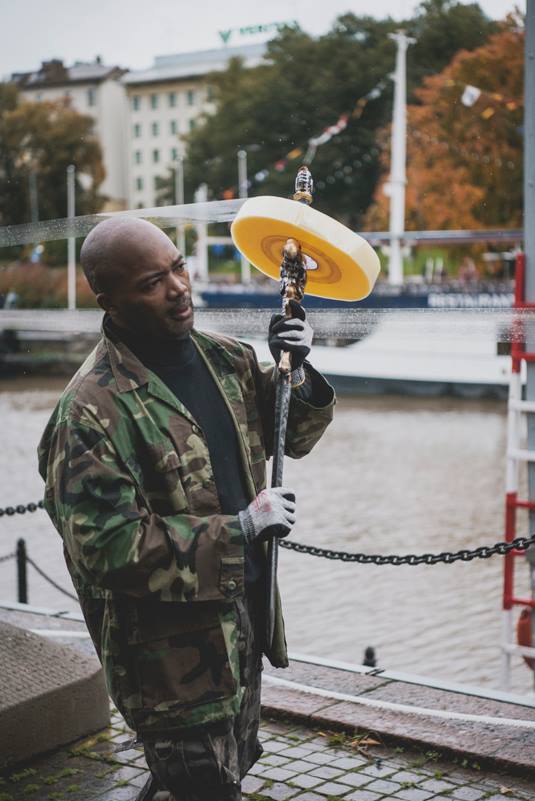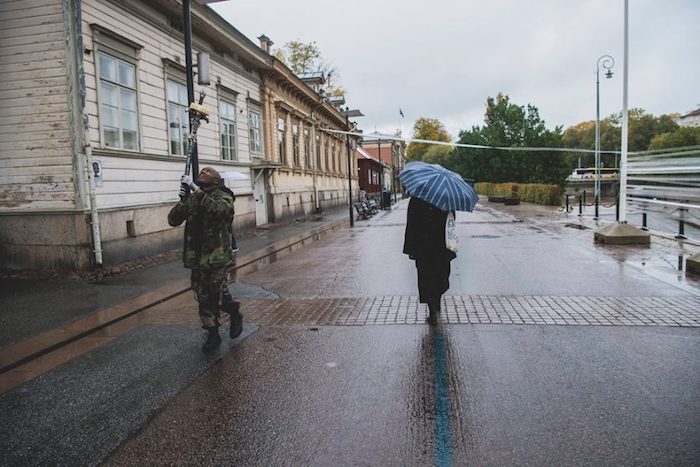
Serge Olivier Fokoua (b. 1976, Cameroon) lives and works between Cameroon and Canada. He received his artistic training in Yaounde, through workshops. In 2011, he attended advanced training on cultural management in Institut für Kultur Konzept in Hamburg, Germany. He recently made a master of visual arts at Université Laval, in Québec. Working mainly in installation and performance, Serge Olivier Fokoua’s work has been presented in numerous art exhibitions, performance events, and projects in Cameroon, Nigeria, South Africa, Senegal, France, Germany, Japan, Poland, USA, Canada and Finland. Fokoua is a co-founding member of Les Palettes du Kamer collective and since 2008 he is the Artistic Director of the Biennale RAVY: Yaoundé Visual Art Encounters (www.ravyfestival.net). Since 2006 he has been a member of IC Zone, an international network of festivals and art centres and has invited over 40 artists and international curators to Cameroon. Currently, he is actively working on multiple platforms for artistic exchange between Cameroon and several countries.
Olivier Fokoua interviewed by Marcio Carvalho

1. For Fanon, struggles for decolonization are first and foremost about self-ownership. They are struggles to repossess, to take back, if necessary by force that which is ours unconditionally and, as such, belong to us. What strategies you use in your art practice that might defy forms of knowledge, remembering and forgetting?
For me, it is impossible to make art without a direct reference to life and the human being. I use art to bring change and fight against hurts. And this fight does not only concern a particular category of people. It is a fight for the cause of the human being against injustice. That is why the issue of decolonization is only one aspect of all the issues that affect humanity. it just constitute one of the different approaches in my art practice. I am not an afro-defender. Neither an anti western. I am simply a justice follower. My artistic acts are very often based on everything that is urgent. Because it's hard for me to conceive that art can be made just for art, because I think like Adorno, that art is above all a social construction.
Decolonizing the knowledge is an urgent issue, but very difficult to solve. This is what sometimes justifies the fact that my artistic orientation, after having searched for ways of exit in the concrete, then launched into utopia to deploy its upheaval and its disarray. To look helplessly at the escape of the world, towards cataclysmic horizons, without being able to do anything to stop the machine. This is the crux of the problem. But I refuse, to make myself a crime partner of the big global micmac, I refuse the politically correct, and I chose to shout on scandal. My role as an artist is to put finger on wound, to decry inconsistencies, or to leave, earlier than to compromise with the aberration. I then position myself in the non-alignment, out of any established system. I create works to resist. As to walk in the footsteps of the famous American resistance fighter Thomas Jefferson who said: "when injustice becomes law, resistance becomes a duty". The duty in this quote is embodied in such names as Nelson Mandela, Martin Luther King, Che Ernesto Guevara, Rosa Park, Angela Davis and many others who have become legends because of their insubordination to injustice.
2. Today there is a gap between image and essence. Images they can distort the essence of a people, a place, a culture, etc, making them distorted, unworthy. Does your work try to restitute both, for better understandings of what lies behind stereotypes and epistemic colonialities?
It's true, there is a big gap between what Africa is, and what is presented as Africa. There are many "clichés" and stereotypes that distort the image of Africa or tell lies about Africa. I remember a few years ago the German artist Rolf Bier who had for artistic concept the sentence: "This is not Africa", " ceci n'est pas l'Afrique". Like to answer to those who have a distorted image of Africa. I will not want to talk about Africa just because I am an African. But I speak of it first because i am a human being in search of justice and equity. Because I think that everyone can defend truth and justice, and it is not a matter of race or nationality. Colonization that has done a lot of harm to Africa is a fact, and everyone is supposed to be offended. Colonization is now part of the history of African peoples, but it is a heavy burden that has killed African cultures and has blunted the opportunities for growth and prosperity of an entire continent. As an artist, I can not redo the history. But I am fighting for the restoration of the truth. I encourage the awakening of consciences. I am deeply against any domination of man by man.
3. Today it's impossible to talk about knowledge without tapping into education. It seems that our education systems they became quiet obsolete in their pedagogies and their forms of knowledge. We still study based on Eurocentric views about the world, which in turn deprive students from a better understanding about the past and consequently a lack of tools to deal with and imagine many presents and futures still to come. What is your opinion about how academy is dealing with knowledge? And If you could use art, or art systems to decolonize the university and make it more pluriversity, and to re-invent the classroom, what would you do?
This is a very serious problem. We all know today that the West has been developed by destroying Africa. West managed to make Africa depend entirely on him. Unable to do anything without going the help of west. Which completely killed the genius of Africa, making african' children the zombies. Since they do not think anymore, but they just execute orders, and expect everything from the west. This inferiority complex has remained until today. And the West has done everything to maintain this domination and hegemony vis-à-vis Africa. The Cameroonian philosopher Hubert Mono Nzana once said, "Our intellectuals are hungry". This was absolutely true, and the consequences are extremely catastrophic. When in a society, the intellectuals are hungry (because they can not provide for themselves), one inevitably leads to what Alain Finkielkraut called "the defeat of thought". Because at this point, the high standards and the Cartesian principles of life governing the true, the right and the good, fall completely into disuse. That's when chao and anarchy set in. But this is not a coincidence, because hunger and poverty are potent tools of domination that the West wields masterfully to maintain its dominant status, as if it was a jungle. But that's it. Because Africa has been violated. He was robbed of his wealth. And that's what it's about in my performance project called "What's for dinner"; that I develop in the big cities of the developed countries. As to tell the West, "give us back what you stole from us". The project has already been developed in Germany, Poland, Canada, and will soon be in Finland.
